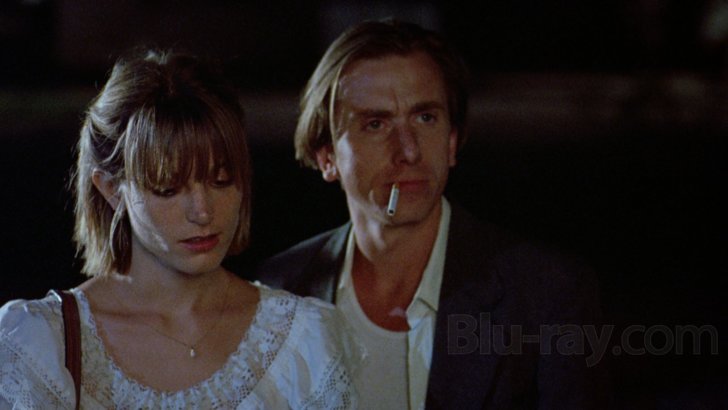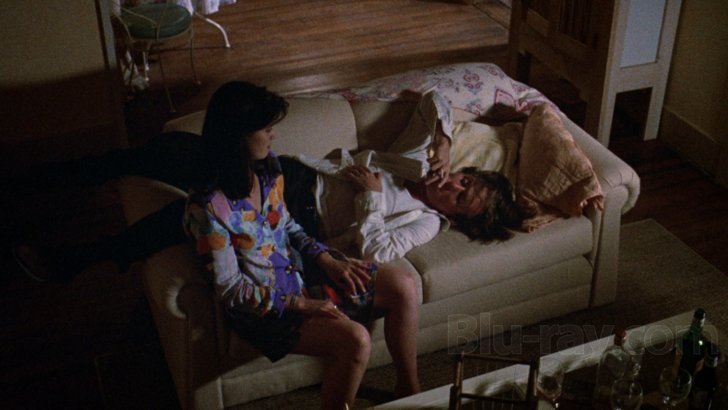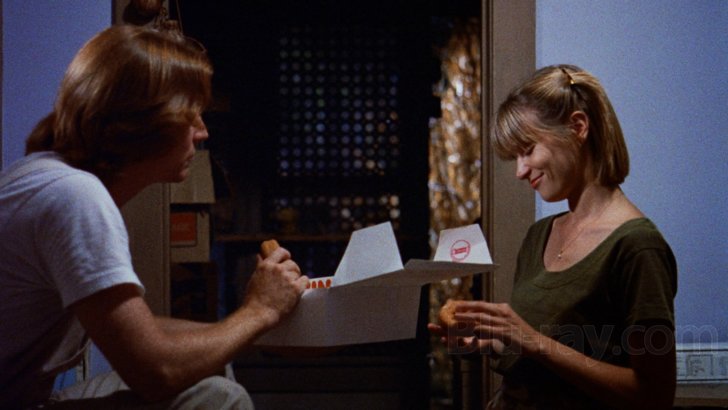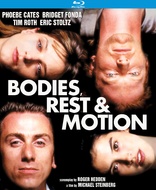Bodies, Rest & Motion Blu-ray Movie
HomeBodies, Rest & Motion Blu-ray Movie 
Kino Lorber | 1993 | 95 min | Rated R | Dec 15, 2020Price
List price:Amazon: $12.49 (Save 50%)
Third party: $12.49 (Save 50%)
Only 4 left in stock (more on the way).
Movie rating
6.7 | / 10 |
Blu-ray rating
| Users | 0.0 | |
| Reviewer | 3.5 | |
| Overall | 3.5 |
Overview
Bodies, Rest & Motion (1993)
In his sleepy Arizona town, Nick ekes out a living selling television sets. He decides, suddenly, that life has more to offer—and that he might find it by moving to Montana with his reticent girlfriend, Beth. But the day before their departure, Nick takes off without Beth, and she's crushed. Spurred on by her best friend and Nick's ex, Carol, Beth takes up with a shiftless, pot-smoking housepainter.
Starring: Phoebe Cates, Bridget Fonda, Tim Roth, Eric Stoltz, Alicia WittDirector: Michael Steinberg
| Drama | 100% |
Specifications
Video
Video codec: MPEG-4 AVC
Video resolution: 1080p
Aspect ratio: 1.78:1
Original aspect ratio: 1.85:1
Audio
English: DTS-HD Master Audio 2.0
Subtitles
English SDH
Discs
Blu-ray Disc
Single disc (1 BD)
Playback
Region A (locked)
Review
Rating summary
| Movie | 3.5 | |
| Video | 3.5 | |
| Audio | 4.5 | |
| Extras | 4.5 | |
| Overall | 3.5 |
Bodies, Rest & Motion Blu-ray Movie Review
Reviewed by Dr. Svet Atanasov February 10, 2021Michael Steinberg's "Bodies, Rest & Motion" (1993) arrives on Blu-ray courtesy of Kino Lorber. The supplemental features on the disc include new program with the director; new program with screenwriter Roger Hedden; vintage featurettes; short film; and more. In English, with optional English SDH subtitles for the main feature. Region-A "locked".

The future is in Montana
Michael Steinberg’s film Bodies, Rest & Motion won’t resonate with you if you went through the ‘90s without ever connecting with people like its four young protagonists. This is the main problem some viewers have had with this film -- it speaks a very particular language, and if you don’t understand it, you won’t be able to grasp what Steinberg set out to accomplish with it.
The film does not tell a conventional story. It uses a series of casual discussions to explore the relationship between existing and happiness in a particular moment in time. This isn’t an original concept for a feature film. Edgar Morin and Jean Rouch’s Chronicle of a Summer, a key film in the Nouvelle Vague, did the exact same type of exploration work, but in a different era and by approaching complete strangers on the streets of Paris and Saint-Tropez. Steinberg’s film has an arty personality and does its exploration work while engaging only four young individuals living in a fictional small town in sunny Arizona.
All of them are in their late twenties. Nick (Tim Roth) makes ends meet as a TV salesman in a not so busy electronics store inside a trendy mall. He lives with Beth (Bridget Fonda), who likes him but is unsure if their relationship has a future. The two are very close with Carol (Phoebe Cates), who is their friendly neighbor, and Nick’s ex-girlfriend. Sid (Eric Stoltz), a single painter, joins them after he is sent to redo Nick and Beth’s place.
The exploration work begins after Nick unexpectedly loses his job and makes an impulsive decision to relocate to Butte, Montana. Before he heads North, he steals a TV set for Beth, but forces her to pick it up from his store. While painting their house, Sid falls in love with Beth, but faces resistance from Carol who is convinced that he is just another player. The rearrangement of the relationships then unleashes unique discussions that focus on what it means to have a fulfilling, genuinely happy life.
The individual frustrations that emerge in the discussions are very simple and easy to understand, so there isn’t anything there that could turn off an outsider with a different mindset. What makes everything else in the film tricky to grasp, or at least in the way(s) Steinberg intended, is the spontaneity behind the decisions the four protagonists make, which is attached to an unusual form of intellectual inertia. Indeed, despite constantly opening up and seeking advice from each other, the four protagonists prefer to trust their instincts and as a result create the impression that they are just floating through their lives. For example, Nick abandons Beth on a whim and heads to Butte not because there is a legit possibility that his life would get better there, but because he feels that just before his departure it is the right thing to do. Despite connecting to Sid, Beth walks away from him for the exact same reason. (Whether intentionally or not, the film implies that this unusual intellectual inertia was in fact a key element in the philosophy of life that Generation X embraced).
The film ends with a speculation that is a lot more intriguing than its exploration work. It concludes that a motionless life is a wasted life, which immediately places the seemingly inexorable desire of its protagonists to follow their instincts, pick new directions on a whim and keep moving forward regardless of consequences in a proper context. There is certainly some truth in this speculation because a life without adventures isn’t worth living. However, change without purpose usually produces more disappointments and hardship that can quickly make a life meaningless as well.
*Roger Hedden adapted his original stage play into the screenplay for Bodies, Rest & Motion. The biggest change was the transfer of the story from a small town in the Connecticut Valley to Tuscon, Arizona.
Bodies, Rest & Motion Blu-ray Movie, Video Quality 

Presented in an aspect ratio of 1.78:1, encoded with MPEG-4 AVC and granted a 1080p transfer, Bodies, Rest & Motion arrives on Blu-ray courtesy of Kino Lorber.
I found the technical presentation very frustrating. The release is sourced from a new 4K master but the film does not have the all-around solid organic appearance I hoped it would. To be clear, this is the healthiest presentation of the film that you could get at the moment, but there are simply way too many issues and limitations on the new master that are impossible to brush aside. For example, the density levels fluctuate a lot and in many areas the grain ecolves into noisy mush, causing native details to collapse or disappear. Plenty of the darker footage, for instance, can look very flat and at times almost as if it is upscaled. The same disappointing fluctuations can be seen during daylight footage as well, where from time to time even color balance becomes unconvincing (see screencapture #23). Encoding optimizations could have been made to address some of these issues, but they would not have been eliminated. (I don't know what element was scanned in 4K, but if it was an interpositive, the density levels just don't look right). There are quite a few areas where highlights should be far more convincing, so this is another issue that trained eyes will quickly identify. Finally, plenty of cleanup work should have been done to ensure that the film looks cleaner. My score is 3.25/5.00. (Note: This is a Region-A "locked" Blu-ray release. Therefore, you must have a native Region-A or Region-Free player in order to access its content).
Bodies, Rest & Motion Blu-ray Movie, Audio Quality 

There is only one standard audio track on this Blu-ray release: English: DTS-HD Master Audio 2.0. Optional English SDH subtitles are provided for the main feature.
The audio is clear and stable. The exchanges were very easy to follow and I did not encounter any balance issues. I felt that there should be a wider range of dynamics, but I am unsure if a new remaster with some specific enhancement would make a substantial difference. There are no audio dropouts, distortions, pops, cracks, or other notable age-related anomalies.
Bodies, Rest & Motion Blu-ray Movie, Special Features and Extras 

- Introduction One - in this new video program, director Michael Steinberg discusses in great detail how Bodies, Rest & Motion was conceived and shot and the very specific role The Replacements played, some of its key thematic similarities with Sex, Lies, and Videotape and why it actually started the trend that made Steven Soderbergh's film successful, its critical reception at home and abroad (the Cannes Film Festival), and why the film remains relevant in some ways. The program was recorded exclusively for Kino Lorber on September 31, 2020. In English, not subtitled. (32 min, 1080i).
- Introduction Two - in this new video program, screenwriter Roger Hedden quickly explains how the original material from his stage play was "moved" to the original screenplay for Bodies, Rest & Motion. The program was recorded exclusively for Kino Lorber. In English, not subtitled. (5 min, 1080i).
- Nightwatch - Michael Steinberg directed this very atmospheric short film about a preacher and The Twilight Zone in 1985. Music and industrial score by Cameron Coulter. In English, not subtitled. (14 min, 1080p).
- Behind the Scenes Featurette - archival featurette with raw footage from the shooting of Bodies, Rest & Motion. In English, not subtitled. (7 min, 480/60i).
- EPK Featurette - vintage featurette with short clips from interviews with cast and crew members. In English, not subtitled. (6 min, 480/60i).
- Trailer - vintage trailer for Bodies, Rest & Motion. In English, not subtitled. (2 min, 1080p).
- TV Spot - vintage TV Spot for Bodies, Rest & Motion. In English, not subtitled. (1 min, 480/60i).
- Commentary - this archival audio commentary was recorded by Michael Steinberg, Eric Stoltz, and writer Roger Hedden. It was also included on the North American DVD release of Bodies, Rest & Motion.
Bodies, Rest & Motion Blu-ray Movie, Overall Score and Recommendation 

You must be able to feel an emotional connection to the four characters in Bodies, Rest & Motion so that the film can 'speak' to you as Michael Steinberg intended. If you can't, there is an excellent chance that its arty personality and exploration work will annoy you quite a bit. In a new video program, Steinberg compares it to Steven Soderbergh's Sex, Lies, and Videotape and suggests that for a number of reasons it should have been just as successful and important. I think that a lot of people would disagree, and there are certainly plenty of good reasons why they would do it. Kino Lorber's release is sourced from a new 4K master, but I found the technical presentation quite underwhelming. Nevertheless, at the moment this release has the best presentation of the film on the market. If you want it in your collection, wait for a sale.
Similar titles
Similar titles you might also like

Ace in the Hole
1951

The Ides of March
2011

Adoration
2008

Sing Sing
2024

Ballast
2008

The Father
2020

Wildlife
2018

Paris, Texas 4K
1984

Way Down East
1920

3 Women
1977

Heaven Knows What
2014

The Servant
1963

Challengers
2024

Somewhere
2010

Where the Green Ants Dream
Wo die grünen Ameisen träumen
1984

Swerve
2011

My Darling Clementine
Theatrical and Prerelease Versions
1946

Ned Rifle
2015

Shoplifters
万引き家族 / Manbiki kazoku
2018

The Ticket
2016
